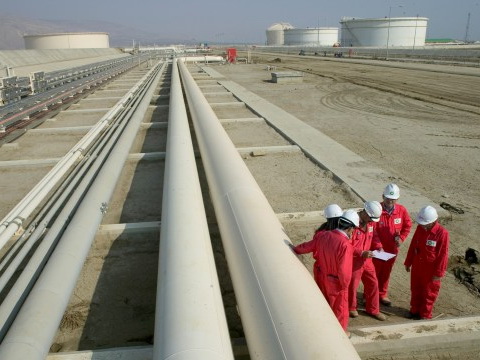South Caucasus Eyes Becoming a Hub Along EU–China Transportation Route

By: Ayaz Rzayev, Vasif Huseynov
On October 15, the European Union adopted a new strategy on connecting Europe and Asia (Consilium.europa.eu, October 15), which became a major theme at the latest Asia-Europe Meeting (ASEM) summit, held in Brussels on October 18–19 (Consilium.europa.eu, October 19).
Under this new connectivity initiative, the EU intends to build a dynamic superhighway combining transcontinental rail lines, roads and maritime networks. Although the strategy has been widely portrayed as Europe’s response to China’s Belt and Road Initiative (BRI) (Deutsche Welle, September 28), the EU was quick to point out that “the European Union and China share an interest in making sure that our respective initiatives work well together, despite the differences in approach and implementation” (Europa.eu, September 19).
Of course, the Sino-European partnership is far from an alliance and contains elements of deep disagreements (The Straits Times, September 24; South China Morning Post, July 16; Ecfr.eu, July 6).
Yet, at the same time, closing the infrastructure gap and boosting connectivity across Eurasia is equally important for both sides. Illustratively, the European Commission’s new long-term budget proposal for 2021–2027 includes plans to increase the EU’s external action budget by 30 percent, with €60 billion ($68.5 billion) set aside explicitly for overseas investments (Ec.europa.eu, May 2).
All three South Caucasus capitals recognize both China’s BRI and the EU’s new connectivity strategy as overlapping with their own foreign-policy goal of transforming their countries into a full-fledged connectivity hub between Europe and Asia. Thus, the regional countries—Georgia, Azerbaijan and Armenia—are heavily invested in the rapid development of the Trans-Caspian International Transport Corridor (TITR), sometimes referred to as the “middle corridor” within the BRI (Agenda.ge, April 13).
The launch of the Baku–Tbilisi–Kars (BTK) railway on October 30, 2017, along with the ongoing construction of a new Baku International Sea Trade Port (Alat)—which will be the biggest multi-purpose port in the Caspian Sea, with a potential capacity to handle 25 million tons of cargo per year—serve to boost the capacity and attractiveness of the TITR (Mfa.gov.az, April 12, 2017).
This transit corridor is meant to provide an alternative route for the transportation of Chinese goods to Europe. In February 2018, Azerbaijani Economy Minister Shahin Mustafayev declared that Baku expects 10–15 percent of goods sent from China to Europe will ultimately pass through its territory (Azernews, February 13).
One major business segment that might potentially make the BTK railroad more appealing for Beijing is the import of premium food products from Europe to China, since the high profit margins of such goods could offset the high shipment costs.
The Russian import ban on several EU products prohibits goods like French cheese, Dutch veal, beef, pork and other foodstuff from entering or even transiting through Russian territory (Forbes, Mart 13, 2017). This might give the BTK a competitive edge over the northern rail routes going through Russia.
Unlike the Southern Gas Corridor (designed to transit Caspian-basin natural gas to markets in southeastern Europe), the transportation corridor through the South Caucasus based on the Baku–Tbilisi–Kars rail route has not been a prominent issue on the EU’s foreign policy agenda until recently. However, this apparently is beginning to change. The Commission’s joint communiqué on the new strategy revealed that the EU recently agreed to extend its Trans-European Transport Network (TEN-T) to the Eastern Partnership countries (which includes all three South Caucasus republics) (Ec.europa.eu, September 19).
The development of the Georgian portion of the TITR constitutes a central agenda item for the Georgian government. Specifically, Tbilisi is focusing efforts on upgrading the East–West highway (estimated to cost $7.5 billion–$10 billion), which connects Azerbaijan and the Black Sea coast across Georgian territory.
Moreover, Georgia is modernizing its freight train network and constructing a deep sea port in Anaklia, mainly for bulk vessels, with a planned annual handling capacity of 100 million metric tons of cargo. All these projects are explicitly designed to improve Georgia’s transportation capacity (China Daily, May 5, 2017).
In May 2017, Tbilisi concluded a free trade deal with Beijing, thus making Georgia the only post-Soviet country that has reached free trade deals with both the EU and China. According to the agreement reached between Georgia’s Economy Minister Dimitry Kumsishvili and Chinese Minister of Transport Li Xiaopeng in April this year, China will help Georgia to upgrade its portion of the TITR (see EDM, April 25).
Although Armenia is prevented from taking part in most of the major transportation projects in the region—due to the embargo imposed by Azerbaijan and Turkey in the wake of Armenia’s occupation of Azerbaijani territories—it seeks to break its isolation by joining China’s BRI.
For this purpose, Yerevan is strongly interested in the establishment of the “Persian Gulf–Black Sea” multimodal transport and transit corridor to link Iran with Europe via Armenia and Georgian Black Sea ports. However, this project, which is expected to cost more than $3 billion, is beyond the financial means of Armenia, whose annual GDP is only around $10 billion (Hetg.am, December 20, 2016).
This is why Armenian leaders hope for Beijing’s involvement, thus helping ensure that their landlocked country can find a place in one of the main transcontinental routes linking China to Europe (Arka.am, March 5).














